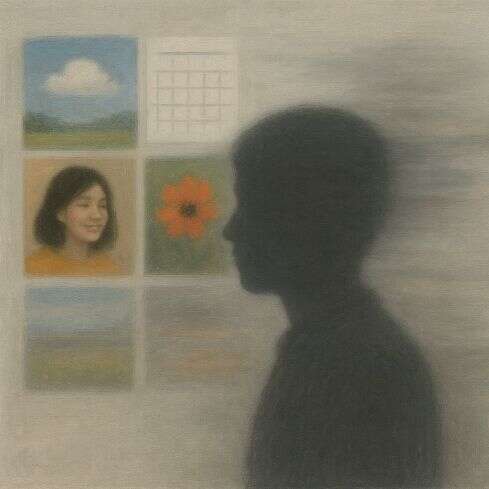
Remember what you did between 2020 and 2022? What actually happened in your life during those years?
I was trying to figure this out the other day and honestly - I got nothing. I mean, I remember being stuck inside. The apartment. The initial weirdness of it all, shock of the lockdown (never having experienced the concept earlier). Or the compulsive doomscrolling we all did in the months that followed.
But after that? Fuzzy. Weirdly fuzzy for something so recent.
I worked from home, ate at home, stayed home. Happily so, I may add; at least, initially. But somewhere in there weeks became months and I just... lost track. There weren’t enough things happening to grab onto. No milestones. Everything staying the same, day after day - in suspended animation, for what seemed like years. And my brain apparently decided none of it was worth remembering.
Which got me thinking about memory. About what sticks and what doesn’t.
______________________________
______________________________
There’s this thing psychologists call the “reminiscence bump” - I came across it in a BBC article - where your teens and twenties stay vivid in your memory but then later, as they put it, “life becomes a bit of a blur.”
And I think I’m starting to understand why.
It’s the novelty. Or the lack of it. Novel experiences create these anchors in time - moments that stick because they’re different from everything around them. Like the first time you rode a bike, or first time you met a friend. But when everything’s the same? Your brain just stops paying attention. Stops recording.
---
And what happens once we have no recollection of extended durations of time? It feels like you lost that time somehow. It’s missing. Sort of like how time seems to speed up as you get older, especially if you’ve settled into patterns you don’t really notice anymore. Suddenly, you find yourself a decade older.
People deal with this in different ways. Some accept it as just how life is once you settle down. Some get really into mindfulness practices, trying to stay present for the mundane. And some buy bike (motorcycles) at 45. Their friends whisper about “midlife crisis”.
I’m starting to think those friends are wrong.
---
Because here’s what I keep coming back to: we expose kids to everything, right? Music lessons and sports and museums and new foods and new places. Constantly putting them in contexts where they make new friends from different backgrounds. We want them to have diverse experiences. We know it matters - makes them more creative, more adaptable, more themselves. Educational institutes and programs try to one-up their offerring on this diversity parameter.
And then at some point we just ... stop. For ourselves, I mean.
We find our favorite restaurant and stick to it. Our weekend routines and comfortable circle of friends. And we protect them. Guard them, even. Over the same menu with the same set of folks.
And then we wonder why the years start melting together.
______________________________
I did this workshop thing once - blindfolded photography. I know, sounds ridiculous. And it was weird and surprisingly terrifying at first - being led around by a stranger while completely unable to see, trying to take photos of things I couldn’t look at. Just solely on the basis of sounds and smell. You lose your bearings fast when you can’t see. Really fast.
But the even more surprising part was how tender it felt. Being guided by someone. Trusting them completely because you have no choice. The vulnerability of it. And also realising - when the role was reversed - that how difficult it is to just guide someone.
That was maybe three years ago and I can still tell you exactly when it happened. Where we were. What I learned. Layout of the place where we walked about.
But ask me what I did on a random Tuesday a month back - nothing. I don;t remember.
______________________________
______________________________
So maybe - and I’m still working this out - maybe we should be doing more of what people dismiss as midlife crisis behavior. Seeking out experiences we haven’t had yet. Not because we’re running from something, but because we’re running toward staying engaged with our own lives. And that’s why - this post on “Pursuit of Interestingness” by Tyagarajan S - really resonated with me. Although, I say, go for it in your life and not just in seeking the next thing to do.
I’m not saying quit everything and and start living like a NatGeo-funded traveler. Though, if you can afford to, why not take an year off and do exactly that? You know you want to!
In my ideal world, there would be scholarships and immersion programs for all age groups designed to offer opportunity to explore “diverse disciplines, develop essential skills, and gain perspectives that will set them apart as they navigate ... life beyond” - as a young scholars program proclaims.
But in the meantime, what if we just tried things? This month, do something you’ve never done. Not “go to a new restaurant.” Actually new. Like the pottery class you’ve been curious about. That play you’d normally skip. Or go do a mountaineering course - I have heard good things about BMC from NIM :)
It doesn’t have to be expensive. Doesn’t have to be dramatic. Just different from your usual fare.
______________________________
______________________________
I think we stop giving ourselves permission for varied experiences at exactly the moment we need them most. When our baseline of novelty drops - when most things aren’t new anymore because we’ve been around a while - that’s when we should be most intentional about seeking the unfamiliar.
Instead we do the opposite. Build walls around our routines. Call it maturity.
I’m not sure that’s really serving us.
Amit
(building NextFive)
(building NextFive)